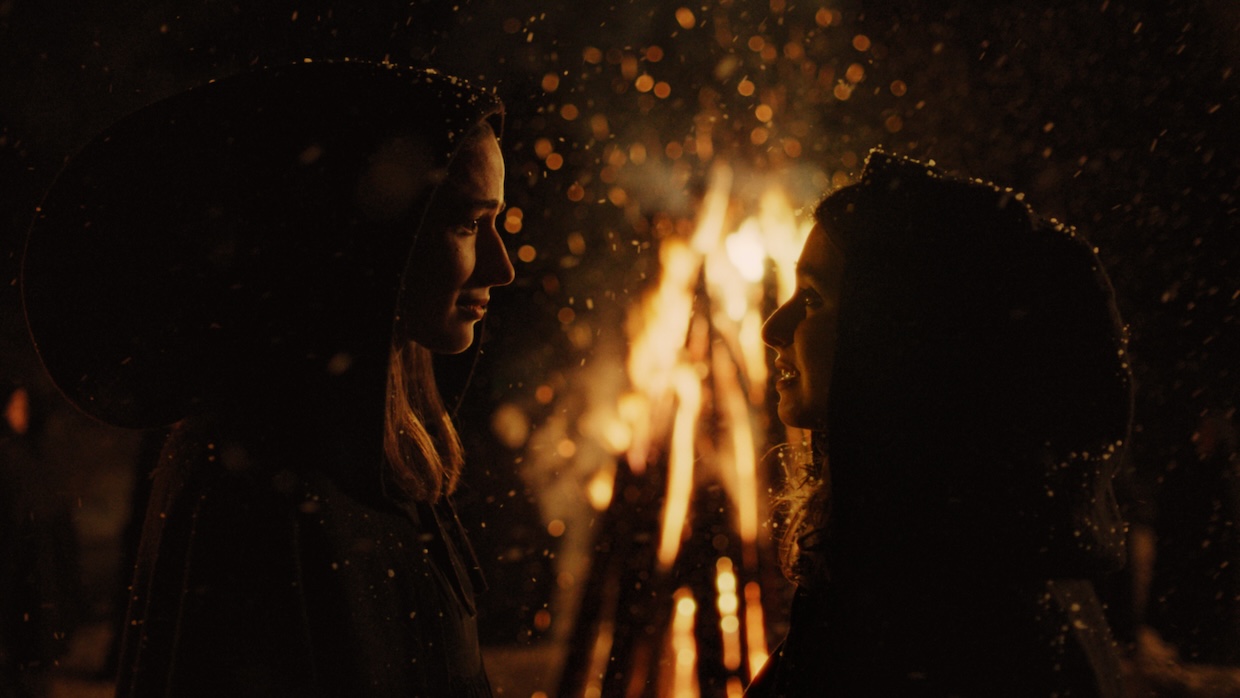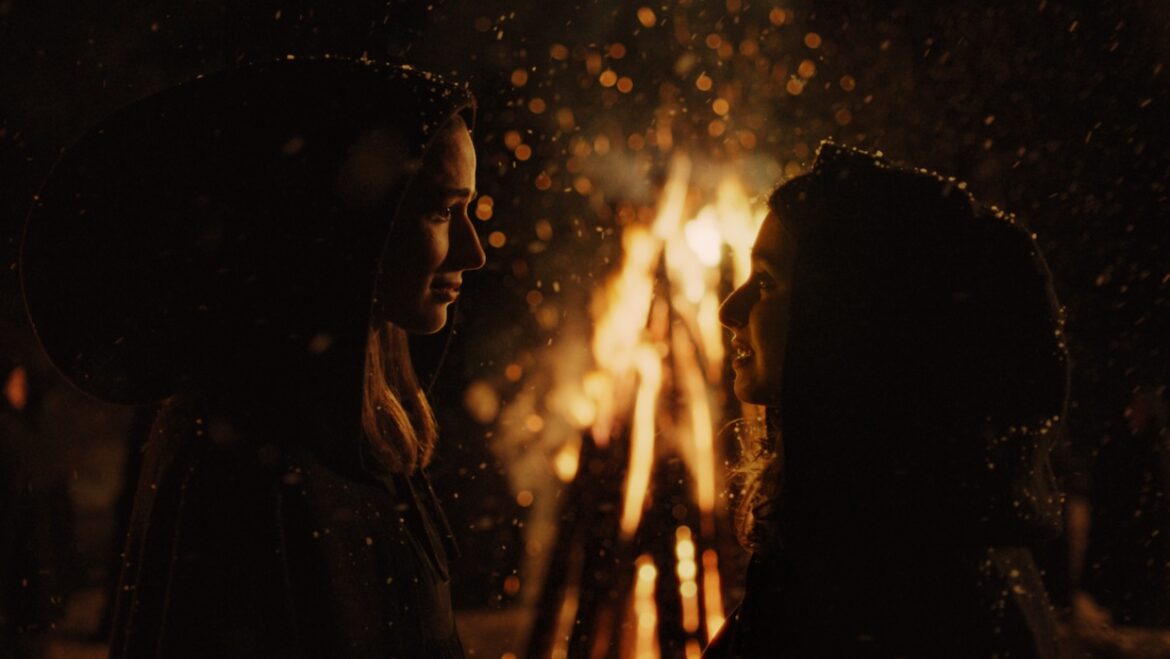 Mariana Cardoso and Bárbara Albuquerque in Maria Vitória
Mariana Cardoso and Bárbara Albuquerque in Maria Vitória
Mario Patrocínio’s Maria Vitória is the writer-director’s first narrative feature, but it brings the chops of his documentary background to ground the story of the titular young woman (Mariana Cardoso). Under the relentless eye of her controlling father Nacho (Miguel Borges), Maria is subjected to a rigorous soccer training regimen that makes having a social life nearly impossible. When her estranged brother Bruno (Miguel Nunes) unexpectedly returns to their small Portuguese village, the film expands from a father-daughter duo to a fraught triangle. Bruno’s queerness challenges his father’s stereotypical machismo; her brother’s former absence and her father’s constant presence are both equally damaging to Maria. Looming over all three is the death of Nacho’s wife in a 2017 fire for which the father has yet to take responsibility for his part.
Following the film’s premiere at the Tokyo International Film Festival, I sat down with Patrocínio to talk about shooting in the remote Portuguese mountains, his casting process and my unexpected connection to his music supervisor.
Filmmaker: I’d like to start with the location. I don’t know what your connection is to that place, if any.
Patrocínio: I shot my prior films outside of Portugal and wanted to find a story and place that would connect deeply with Portuguese culture. In 2017 there was a huge fire in that region, Serra da Estrela, and more than 100 people died. I started going there and trying to understand the space itself, to connect with the energy of villages and communities now there. [The city] was introduced to me by a friend, and definitely, when I got in touch with that region, I felt like, “This is the center of Portugal. It’s precisely the opposite of what people usually associate with Portugal, which is summer.” How is it to live in the coldest place? Not just the weather, but people have to be really tough because of nature.
Filmmaker: It sounds like a documentary immersion process. How did that work for you? Did you go and stay?
Patrocínio: Yeah, for almost five years, I was going there at least three times a year—sometimes a week, sometimes 15 days, just trying to understand the challenges that everybody would go through. There’s a lot of immigration, so in villages with almost no people, the ones who stayed are really frustrated. Or [the residents] did something wrong outside, and they’re coming back. The only things that people still get around, the three things that touch everybody, are church, football and the fires in the woods.
Filmmaker: Who was your introduction to the village? Was there someone from the local council?
Patrocínio: Yes, at the beginning, I had someone from there that would take me to places. And then meeting people, just being in a normal cafe, seeing life passing by—step by step, you start building a certain world. It’s not just one place, one village, it’s several villages that I went to where I saw the same way of being, the same reality that repeats itself.
Filmmaker: So, the story emerged from your observation of the place, rather than from the characters first.
Patrocínio: A friend of mine had a story about someone who came home, and I started to think, how it would be to come home? But what really changed for me in this process was my mother died in 2018. The grief that I was feeling in everything, I understood that all that people that lived in that same place had the same connection, because they had lost [people] in that huge fire. That completely changed the story. I wanted to tell the story about a girl, because I also connected with feminine energy and my mother, my grandmother, and how they deeply changed my life. I gave the main character the name of my mother.
Filmmaker: Let’s talk a bit about your casting process. Your lead performer has to either be able to actually do, or seem to be able to do, three specific things: be a goalie, sing and also rap a bit, which is a lot of stuff for one person to do.
Patrocínio: Years ago, when we didn’t have the financing yet, I went to do casting to try to identify who would be the young actress that could do that role. Then, when it came to filming last year, I called her back because I felt she was the one, and then we talked about that: “Look, I need this to be real. How athletic are you?” And by chance, her father is a football coach, so having the understanding of what it is to be on the field immediately helped. She lived in many places in the world because of that, so she understood it all. Then, I asked, “You’ll be training for two, three months to be a goalkeeper. Are you up to it? And she was like, “I’m going to be the best goalkeeper.” At the same time, I knew she sang. [Her singing] was not something that was there at the beginning in the film, but when I understood that singing is a way of gaining your own voice, and some people never have the courage, it was symbolic and I wanted to use that in the film. So, it was a process that started almost two-and-a-half years ago.
Filmmaker: The brother has to drive stick-shift.
Patrocínio: Well, in Portugal, it’s quite common. Now it’s becoming automatic, but for years it was just sticks.
Filmmaker: The reason I noticed is because often when people shoot the process trailer, you can tell because it’s slow and in front, and you make a real point of shooting from the back seat so you can see that he’s driving. So, was it integral to your conception of the role that the actor who played it had to be able to drive?
Patrocínio: I don’t do normal castings, like [where I] give you the text. I first of all have a conversation [with the actor already] in character. Even if I don’t know 100% what’s the character, I see what I can grasp from what you are or have inside of you that I will be able to build up with you. Of course, we asked if he could drive and he could, which was good for us. The most important thing is for them to understand the character. We of course have the script as a guide, but then there are certain things that I keep out, specific sentences that I only give in the moment to one actor or the other. For example, there was a sentence that I only gave to Miguel: “You should have been the one who died.” That was a sentence that the father didn’t know [was coming]. I waited until the fifth or sixth take, then I went to Miguel and said, “At this moment, just say that.” And the father says, “I know.” The father, from the beginning, would never say that, and I didn’t give give the sentence to the father, so he reacted naturally. It completely changes the dynamic between them.
Filmmaker: How long is your rehearsal process before you start filming?
Patrocínio: Ideally, we would have two months to play.
Filmmaker: How long did you actually have?
Patrocínio: I think a month and a week or so. We had 35 days to shoot. I always tell production “If we rehearse, it’s going to be easier when we shoot,” even if it’s twice a week.
Filmmaker: There’s also a choreographer credit. Is that for the for the gameplay itself?
Patrocínio: Barbara [Albuquerque]—she’s the girl who kisses the main actress—was 100% new. She had done no films and was kind of stiff. I needed her to understand her body and how she could move. The choreographer helped a lot to understand body movement and get loose.
Filmmaker: Did the choreographer work with anyone else or just with her?
Patrocínio: No, just her.
Filmmaker: That’s such a luxury. What a treat. What are some of the challenges of shooting in a location like that that’s remote and elevated?
Patrocínio: First of all, shooting in winter, you have almost no hours of light. It was quite cold. Of course, we tried to concentrate the locations as much as possible But, you know, it’s a mountain—it can rain, wind, snow. The weather itself brings you something. We were quite lucky, I can say, because all the days that we really needed to be beautiful, we had it. But I think the biggest challenge is total isolation, because it’s a remote place. It’s three hours from Lisbon, but it is remote in the sense that there’s almost nothing in the winter: not a lot of restaurants to go or places to relax. It’s just, you know, 30 residents, two things. So you need to keep yourself well. That was the challenge for me. But I wanted so much to do the film that that’s nothing. You get in chaos sometimes, but then you just drive through it. For example, we were supposed to shoot in a certain place—but it rained a lot, so a small river became a big river, so we had to find another location.
Filmmaker: For my last question, I want to ask you about working with your music supervisor, Troupe Gammage. There’s a lot of different kinds of music in the movie, but also I went to high school with that guy I saw his name in the credits and lost my mind a little
Patrocínio: So Katie Byron, who’s a production designer, [as a co-producer] I did a film with her with Nicolas Cage shot in Portugal, Color Out of Space. We got to be friends, and at a certain point she married Troupe and wanted to go back to Portugal. Basically, Katie Byron did the production design of our film, and I knew Troupe works with music for games and films. There was a certain point where needed something that I was not achieving, and I needed someone to come from outside. That’s when I talked to Troupe: “Man, please come here and help me, because there are some things missing here that are crucial to certain scenes.” And they were having the baby at the same time! So, Katie did the preparations, then she went to have a baby, then she went on-set to do the preparation of the house. Then she could relax a bit, because it was insane.


AloJapan.com